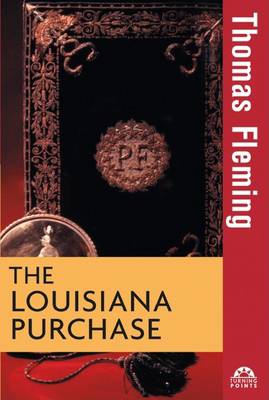
- Retrait gratuit dans votre magasin Club
- 7.000.000 titres dans notre catalogue
- Payer en toute sécurité
- Toujours un magasin près de chez vous
- Retrait gratuit dans votre magasin Club
- 7.000.0000 titres dans notre catalogue
- Payer en toute sécurité
- Toujours un magasin près de chez vous
37,45 €
+ 74 points
Description
From The Louisiana Purchase
Like many other major events in world history, the Louisiana Purchase is a fascinating mix of destiny and individual energy and creativity. . . . Thomas Jefferson would have been less than human had he not claimed a major share of the credit. In a private letter . . . the president, reviving a favorite metaphor, said he "very early saw" Louisiana was a "speck" that could turn into a "tornado." He added that the public never knew how near "this catastrophe was." But he decided to calm the hotheads of the west and "endure" Napoleon's aggression, betting that a war with England would force Bonaparte to sell. This policy "saved us from the storm." Omitted almost entirely from this account is the melodrama of the purchase, so crowded with "what ifs" that might have changed the outcome-and the history of the world.---
In 1801, relations between the world's only two republics, the United States and France, were at a low ebb. American merchants had just lost millions of dollars to French privateers in the "Quasi-War" of the late 1970s, and Napoleon was scheming to acquire the Louisiana Territory from Spain and create a "wall of brass" that would halt America's westward expansion. Yet a few years later, Napoleon agreed to sell Louisiana to the United States for $15 million. How did America manage to double its territory and end French colonial ambitions in the New World--without firing a shot?
Taking us behind the scenes in Thomas Jefferson's raw "federal village" of Washington, D.C., and inside the duplicitous world of Napoleonic Paris, Fleming shows how Bonaparte haters in Spain, the French army's disastrous failure in Haiti, some wily American negotiating, and napoleon's resolve to renew his was the "perfidious Albion" led to the momentous French decision to sell Louisiana--and cede 838,000 square miles of land to the United States. We meet a host of fascinating characters as they attempt to advance their nations' interests through diplomacy, threats, lies, bribery, and treachery.
Like many other major events in world history, the Louisiana Purchase is a fascinating mix of destiny and individual energy and creativity. . . . Thomas Jefferson would have been less than human had he not claimed a major share of the credit. In a private letter . . . the president, reviving a favorite metaphor, said he "very early saw" Louisiana was a "speck" that could turn into a "tornado." He added that the public never knew how near "this catastrophe was." But he decided to calm the hotheads of the west and "endure" Napoleon's aggression, betting that a war with England would force Bonaparte to sell. This policy "saved us from the storm." Omitted almost entirely from this account is the melodrama of the purchase, so crowded with "what ifs" that might have changed the outcome-and the history of the world.---
In 1801, relations between the world's only two republics, the United States and France, were at a low ebb. American merchants had just lost millions of dollars to French privateers in the "Quasi-War" of the late 1970s, and Napoleon was scheming to acquire the Louisiana Territory from Spain and create a "wall of brass" that would halt America's westward expansion. Yet a few years later, Napoleon agreed to sell Louisiana to the United States for $15 million. How did America manage to double its territory and end French colonial ambitions in the New World--without firing a shot?
Taking us behind the scenes in Thomas Jefferson's raw "federal village" of Washington, D.C., and inside the duplicitous world of Napoleonic Paris, Fleming shows how Bonaparte haters in Spain, the French army's disastrous failure in Haiti, some wily American negotiating, and napoleon's resolve to renew his was the "perfidious Albion" led to the momentous French decision to sell Louisiana--and cede 838,000 square miles of land to the United States. We meet a host of fascinating characters as they attempt to advance their nations' interests through diplomacy, threats, lies, bribery, and treachery.
Spécifications
Parties prenantes
- Auteur(s) :
- Editeur:
Contenu
- Nombre de pages :
- 194
- Langue:
- Anglais
- Collection :
- Tome:
- n° 2
Caractéristiques
- EAN:
- 9781681620091
- Date de parution :
- 01-06-03
- Format:
- Livre relié
- Format numérique:
- Genaaid
- Dimensions :
- 127 mm x 203 mm
- Poids :
- 340 g

Les avis
Nous publions uniquement les avis qui respectent les conditions requises. Consultez nos conditions pour les avis.






